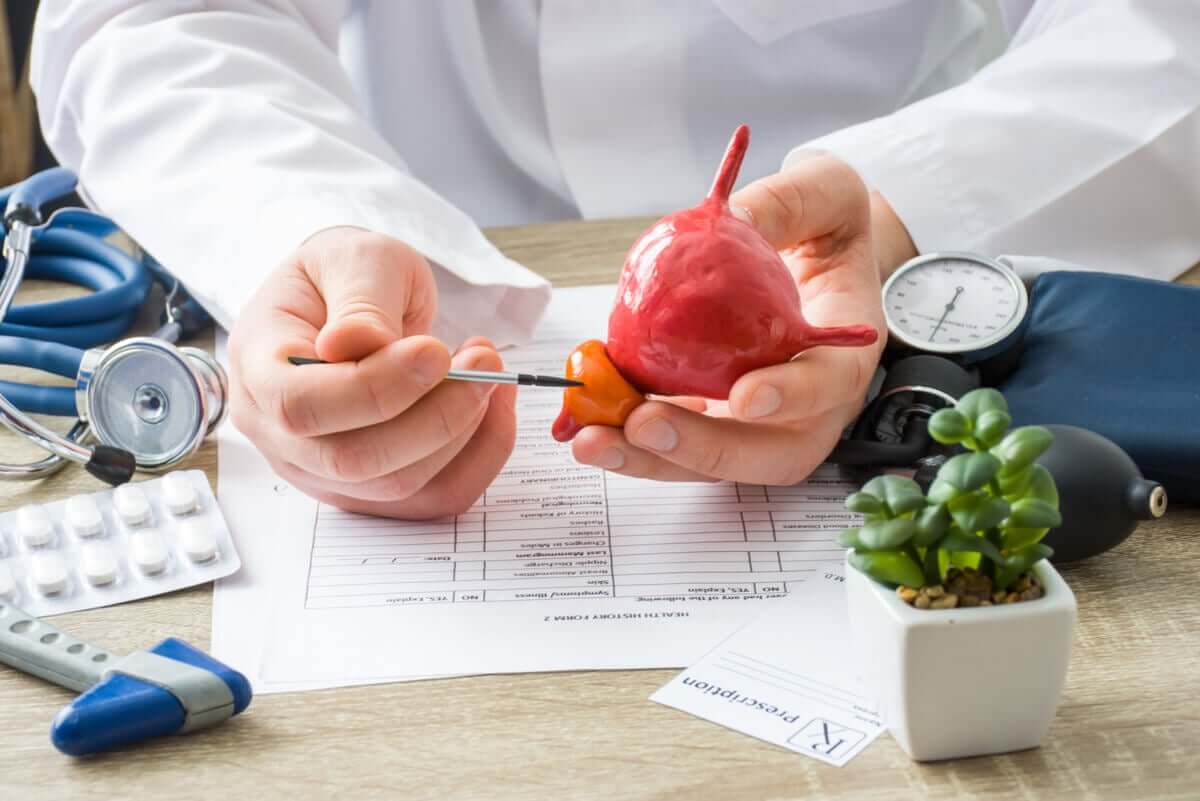5 Tips to Help Prevent Prostate Cancer


Written and verified by the doctor Leonardo Biolatto
Preventing prostate cancer is key because it represents one of the most frequent types of cancer today. It’s a serious disease, the appearance of which depends on numerous factors. It usually occurs in men over 65 years of age.
The truth is that specialists don’t know the exact cause of why it occurs. However, they know that there are certain behaviors and habits that promote it. Although its prevention isn’t always possible, there are ways to minimize the risk of suffering it. In this article, we’ll explain 5 tips to help prevent prostate cancer.
What is prostate cancer?
The prostate is an organ that’s part of the male reproductive system. It’s not present in women. As explained by the Centers for Disease Control and Prevention, it’s the size of a walnut and sits below the bladder, just in front of the rectum.
The prostate envelops a portion of the urethra. Its main function is to produce seminal fluid. This fluid forms part of semen and helps transport the sperm that come from the testicles and are expelled during ejaculation.
Prostate cancer is a common type of neoplasm. In fact, as expressed by the Spanish Association Against Cancer, it’s the second most frequent among men. So much so, that in Spain about 31,000 new cases were detected in 2018 and about 6000 males died from this disease.
Like any other cancer, it consists of altered cells. That’s why they proliferate uncontrollably and invade surrounding tissues, damaging them. In addition, it can generate metastasis.
It’s important to emphasize the difference between prostate cancer and benign hyperplasia. The latter is a frequent health issue associated with age in which the organ increases in size. However, the cells don’t have cancerous features.

Risk factors for the disease
Although specialists don’t know the exact cause of why prostate cancer occurs, a series of factors that increase the risk have been identified. According to the specialists of the Prostate Cancer Foundation, one of the most relevant is age.
Most cases are detected after the age of 65-69. Furthermore, as one gets older, the incidence increases notably. However, this doesn’t mean that young people can’t suffer from it.
On the other hand, having a family history is another of the most important risk factors. In fact, in these cases it usually appears early, before the age of 60.
Race is also a determining factor. African-American men have a much higher incidence of prostate cancer. Unfortunately, they also have a higher risk of dying from it.
Researchers have also shown that the place of residence plays a role. For example, there are certain countries where the risk is increased, such as in the United States. This seems to be associated with habits and characteristics of the area, as well as exposure to sunlight or diet.
Tips for preventing prostate cancer and reducing risk
As we’ve just seen, there are a number of factors that increase risk and are not modifiable. A man can’t modify his age, race or genetics. Therefore, there’s no definitive way to prevent prostate cancer.
However, numerous research studies show that there are measures that could help reduce the risk of developing it. In the following sections we’ll explain what they are.
1. Taking care of your diet
According to Mayo Clinic specialists, diet is one of the aspects to be taken into account when it comes to preventing this cancer. It seems that a low-fat diet can reduce the risk.
An article published in Redacción Médica explained that dairy products were also associated with prostate cancer. Men who eat a lot of dairy products per day (such as cheese, milk or yogurt) have a higher risk of developing prostate cancer.
You may like: Dietary Supplements to Promote Well-Being
2. Maintaining a healthy weight to prevent prostate cancer
Weight is another aspect that seems to influence the development of prostate cancer. Obesity and excess weight increase the risk. That is, having a body mass index greater than 30.
Weight is, in turn, closely related to diet and exercise. That’s why doctors recommend that, in cases of obesity, you should achieve weight loss by taking care of diet and avoiding a sedentary lifestyle.
3. Exercise
Different studies, such as one published by ICUA Advanced Urology, explain that regular exercise is one of the ways to prevent this cancer. Not only that, but it also produces many other benefits, such as improving blood pressure and cholesterol levels.
In addition, as we’ve just pointed out, it’s one of the fundamental aspects for losing weight. That’s why specialists recommend exercising at least three times a week at a moderate intensity. We must try to adapt the physical activity to the conditions of each person.
4. Sexual activity to prevent prostate cancer
Another way to reduce prostate cancer is sexual activity. The organ, as we’ve seen, is part of the male genital tract. In fact, it’s responsible for producing part of the semen.
Therefore, frequent sexual intercourse helps to stimulate it. It can serve to prevent cancerous lesions by reducing the accumulation of substances inside it. However, it’s essential that it’s always safe and healthy sex.
5. Avoid medications and drugs
Drugs and medicines are chemical substances that tend to produce harmful effects in the body. Many of them accumulate and can cause reactions in the tissues that, over time, end up damaging them.

When is it necessary to consult a doctor?
Nowadays, prostate cancer is very common in most countries. Doctors perform screening tests in order to diagnose it in time. That’s why it’s essential for all men to see a doctor on a regular basis, especially if there’s a family history of this disease.
Also if symptoms appear, such as discomfort when urinating, interrupted urinary stream or bleeding. You should take special care when you’re over 60 years of age.
Discover: How a Prostate Exam Is Carried Out
Remember that prostate cancer is very common
As we’ve seen, prostate cancer is the second most common type of cancer in men. While it’s true that there’s no definitive way to prevent it, there are many simple measures that can help reduce the risk.
The most important thing is to try to lead a healthy lifestyle. Diet, exercise and weight are fundamental aspects to take care of. In addition, you must visit your doctor regularly, especially if you have risk factors.
All cited sources were thoroughly reviewed by our team to ensure their quality, reliability, currency, and validity. The bibliography of this article was considered reliable and of academic or scientific accuracy.
- Ejercicio intenso y su relación con el cáncer de próstata. (n.d.). Retrieved January 23, 2021, from https://www.icua.es/cancer-prostata/realizar-25-minutos-diarios-de-ejercicio-intenso-reduce-hasta-en-un-30-el-riesgo-de-cancer-prostatico/
- Prevención del cáncer de próstata: formas de reducir el riesgo – Mayo Clinic. (n.d.). Retrieved January 23, 2021, from https://www.mayoclinic.org/es-es/diseases-conditions/prostate-cancer/in-depth/prostate-cancer-prevention/art-20045641
- Los productos lácteos, con mayor riesgo de cáncer de próstata. (n.d.). Retrieved January 23, 2021, from https://www.redaccionmedica.com/secciones/oncologia-medica/los-productos-lacteos-asociados-con-mayor-riesgo-de-cancer-de-prostata-2924
- Prostate Cancer Prevention | Prostate Cancer Foundation. (n.d.). Retrieved January 23, 2021, from https://www.pcf.org/patient-resources/family-cancer-risk/prostate-cancer-prevention/
- Cáncer de próstata:Toda la información que necesitas | AECC. (n.d.). Retrieved January 23, 2021, from https://www.aecc.es/es/todo-sobre-cancer/tipos-cancer/cancer-prostata
- ¿Qué es el cáncer de próstata? | CDC. (n.d.). Retrieved January 23, 2021, from https://www.cdc.gov/spanish/cancer/prostate/basic_info/what-is-prostate-cancer.htm
This text is provided for informational purposes only and does not replace consultation with a professional. If in doubt, consult your specialist.








